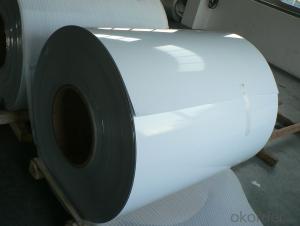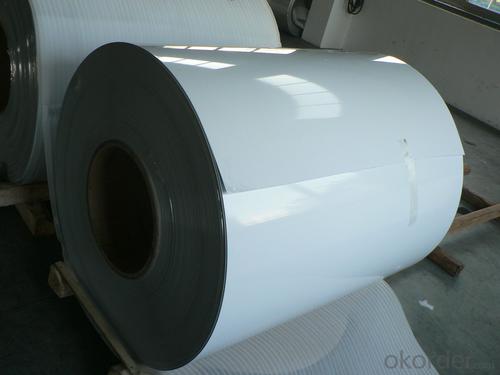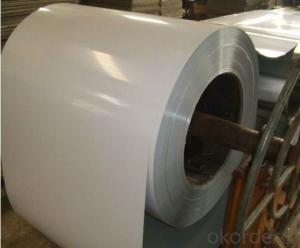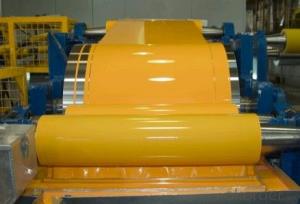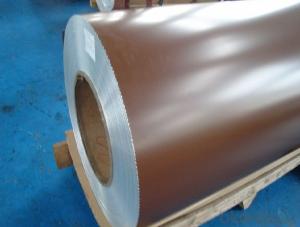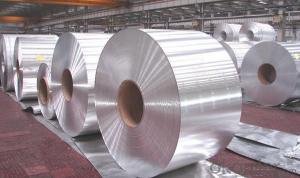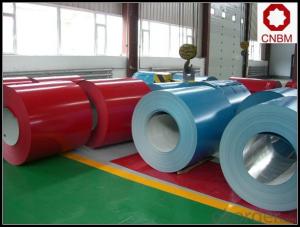Aluminum Coil Epoxy Coated Aluminium Coils 3003 H14 for ACP
- Loading Port:
- Shanghai
- Payment Terms:
- TT OR LC
- Min Order Qty:
- 5 m.t.
- Supply Capability:
- 10000 m.t./month
OKorder Service Pledge
OKorder Financial Service
You Might Also Like
Specification
1. Structure of Coil Coating Aluminium Coils 3003 H14 for ACP Description
• Product: Aluminim coils
• Application:
corrugated roofs, outer walls, ovens, electrically controlled cabinets.
household appliances, transportation, base plate, color coating.
industrial freezers in the residential and industrial buildings.
refrigerator backplane, gas stove, air conditioner, microwave, LCD border.
• Advantage: Full production line with all kinds of coils supply
2. Main Features of the Coil Coating Aluminium Coils 3003 H14 for ACP
• Our goods quality is top, the surface is smooth, and every steel coil
• No Joint, No Bends, no spots, no roller marks.
• MTC will be provided with goods, third part inspection is acceptable, for example, SGS, BV. Etc
3. Coil Coating Aluminium Coils 3003 H14 for ACP Images
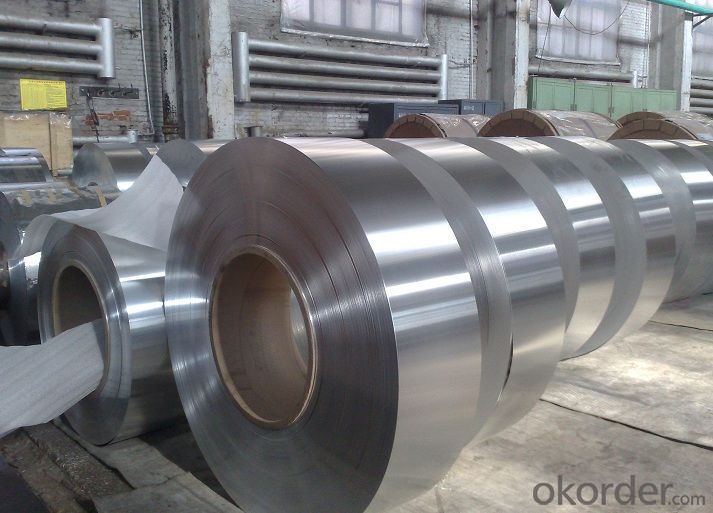
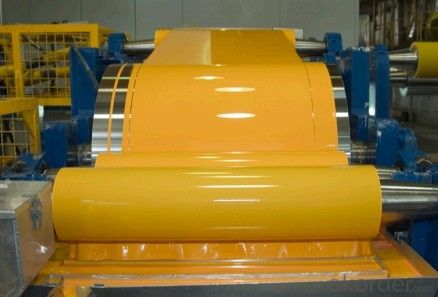
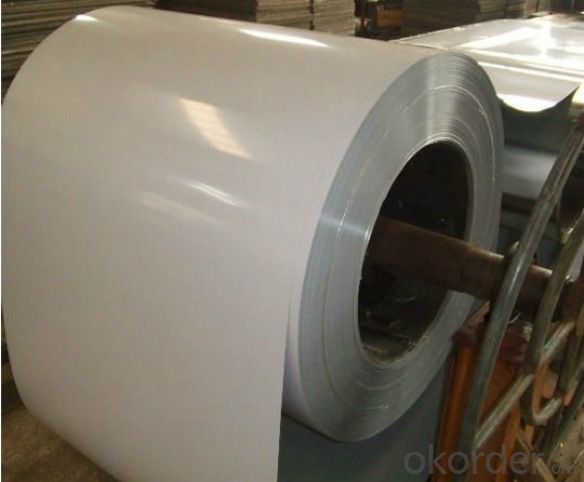
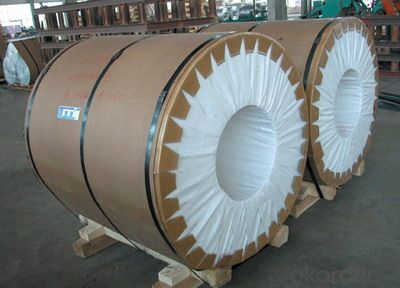
4. Coil Coating Aluminium Coils 3003 H14 for ACP Specification
Alloy | AA1050/1100/3003/3005/3105/5005/5052 etc |
Thickness | 0.03mm—4.0mm |
Width | 10mm—1600mm |
Coating | PVDF, PE |
Coatingthickness | Usually16-25 micron, could be 33-40 micron |
Color | According to Ral |
Standard | ASTM-B 209 GB/3008-2006 |
Usage/ApplicationsCoated Aluminum Coil/Sheet | Constructionand decoration, electronic appliances, lighting decoration, air-condition airpipe, sandwich panels and drainage, etc |
5.FAQ of Coil Coating Aluminium Coils 3003 H14 for ACP
We have organized several common questions for our clients,may help you sincerely:
① How about your company?
A world class manufacturer & supplier of aluminum coil and alloy blanks. Aluminum production base is comprised of 18 aluminum annealers, 10 coil and foil mills, 4 continuous production lines, 2 hot rolling production line and 3 prepainted lines.
Export 5000 tons per month to Asia, America and Middle East. Always do the best for our clients.
②Can you guarantee the quality of the products?
We are responsible for the quality of materials to get a long-term cooperation with clients in a reasonable period of time and we are glad to arrange and coordinate any third party inspection for you.
③What is the delivery time after purchase?
35 day after receiving client’s deposit or correct LC
- Q: What is an aluminum coil and what is it used for?
- An aluminum coil, shaped like a rolled-up sheet of aluminum, is made from high-quality aluminum alloys known for their durability, lightweight nature, and resistance to corrosion. Aluminum coils are widely used in various industries, particularly in the manufacturing sector where they are utilized to create aluminum products like cans, containers, and packaging materials. The flexibility and malleability of aluminum coils allow them to be easily shaped into different sizes and forms. Moreover, the construction industry extensively relies on aluminum coils for multiple purposes. These coils are commonly employed in roofing, siding, gutters, and other exterior applications due to their ability to withstand harsh weather conditions and resist corrosion. Their lightweight nature also simplifies handling and installation, reducing labor and transportation expenses. Furthermore, aluminum coils play a crucial role in heating, ventilation, and air conditioning (HVAC) systems. They are integral components in the production of condenser and evaporator coils, which are essential for regulating temperature and humidity in residential, commercial, and industrial buildings. To summarize, aluminum coils are highly versatile and valuable materials that have widespread applications in numerous industries. Their lightweight nature, resistance to corrosion, and malleability make them an excellent choice for manufacturing aluminum products, as well as for construction and HVAC applications.
- Q: They say aluminum can be found in deodorants.And this aluminum is absorbed by the skin and block pores.Does the amount of aluminum affect the rate of how it dries up?
- Al does not have the ability to retain heat for very long. Therefore theroretically, the greater the amount of Al the faster the substance would dry.
- Q: What are the different coil slitting widths available for aluminum coils?
- The different coil slitting widths available for aluminum coils vary depending on the specific requirements and industry standards. Generally, aluminum coils can be slit into various widths ranging from as narrow as 0.5 inches to as wide as 72 inches or even wider. The exact range of available coil slitting widths is determined by the equipment and capabilities of the coil slitting facility. These coil slitting widths cater to different applications and industries such as automotive, construction, packaging, and electronics. Some common coil slitting widths for aluminum coils include 12 inches, 24 inches, 36 inches, and 48 inches. However, it is important to note that custom slitting widths can also be requested to suit unique project needs.
- Q: Why do we need aluminum when cooking in the oven at all.
- Keeps the top from getting over cooked and the foil keeps the steam in so your food with be moist.
- Q: Can aluminum coils be anodized?
- Yes, aluminum coils can be anodized. Anodizing is a process of enhancing the natural oxide layer on the surface of aluminum to create a more durable and corrosion-resistant coating.
- Q: Can aluminum coils be used in the production of aluminum composite windows?
- Yes, aluminum coils can be used in the production of aluminum composite windows. Aluminum coils are often used as a raw material for manufacturing aluminum composite windows due to their versatility, durability, and cost-effectiveness. The coils can be shaped and formed into various components of the windows, such as frames, sashes, and mullions, providing strength and stability to the final product. Furthermore, aluminum coils can be coated or painted to enhance the appearance and protection of the windows, making them suitable for both residential and commercial applications.
- Q: What are the various applications and purposes of aluminum coil in different industries?
- <p>Aluminum coil is widely used in numerous applications due to its lightweight, corrosion resistance, and high strength. It is commonly used in construction for roofing and siding, in the automotive industry for body panels and heat exchangers, and in the packaging industry for food and beverage cans. Aluminum coil is also utilized in electrical applications such as transformers and wiring, and in the manufacturing of everyday items like foil and cookware. Its versatility makes it a popular material in various industries.</p>
- Q: Are there any limitations to the maximum coil length of aluminum coils?
- Yes, there are limitations to the maximum coil length of aluminum coils. The length of aluminum coils is typically restricted by factors such as the capabilities of manufacturing equipment, transportation constraints, and handling limitations. Additionally, longer coils are more prone to issues like coil sagging and deformation during storage or handling. Therefore, there is a practical limit to the maximum coil length that can be produced and effectively utilized in various industries.
- Q: Can aluminum coils be used for signage and display applications?
- Yes, aluminum coils can be used for signage and display applications. Aluminum is a versatile material that is lightweight, durable, and resistant to corrosion, making it an ideal choice for various signage and display purposes. Its flexibility allows for easy shaping and customization, while its smooth surface provides a perfect canvas for printing graphics and designs. Additionally, aluminum coils can be easily mounted, making them suitable for both indoor and outdoor signage and displays.
- Q: This is not for around the house. It is for my lab. I am pretty sure these one wires are Aluminum, but I need the connector they were made with and the power cable is copper. Would it be okay to still try to join the two.
- yes but use wire nuts
Send your message to us
Aluminum Coil Epoxy Coated Aluminium Coils 3003 H14 for ACP
- Loading Port:
- Shanghai
- Payment Terms:
- TT OR LC
- Min Order Qty:
- 5 m.t.
- Supply Capability:
- 10000 m.t./month
OKorder Service Pledge
OKorder Financial Service
Similar products
Hot products
Hot Searches
Related keywords
